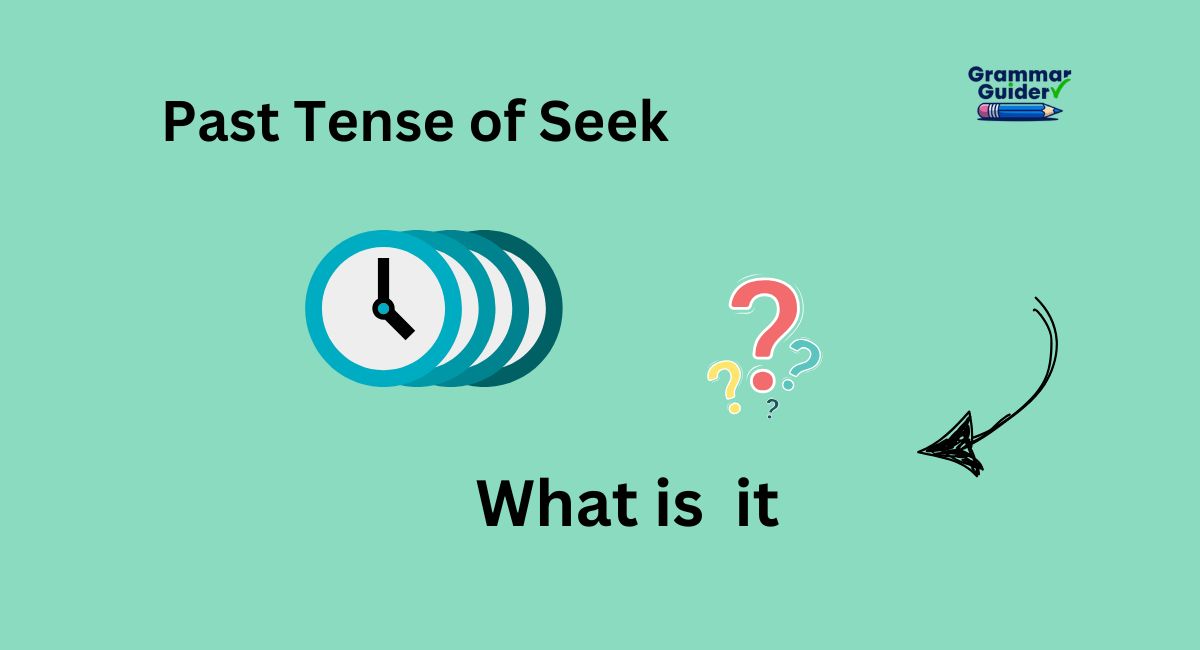The past tense of seek is sought. When you are looking for something now, you seek it. But when you talk about looking for something in the past you use sought. For example “I sought help yesterday.”
In simple terms you always use seek for present or future actions. When telling a story about the past use sought. This helps make your language clear and accurate. Remember, seek is for now, and sought is for things that happened before.
In the Present: Seeking Wisdom
In the present people are seeking wisdom every day. They look for answers ideas and knowledge. Whether through books experiences or conversations they work hard to seek new thoughts and wisdom to improve their lives and grow.
Example:
Examples show how we use seek and sought in sentences. For instance, “I seek knowledge every day” is something you do now, while “She sought help last week” talks about the past.
In the Past: The Quest of “Sought”
In the past, we used the word “sought” when talking about looking for something. For example, if someone was looking for answers or knowledge, they sought them. It is the past form of seek and shows a past action.
Example:
In the past when you look for something, you use the word “sought”. For example “Last summer, she sought peace in the mountains.”
Present vs. Past: Easy Recap
In the present, we use seek to show looking for something now. In the past, we use sought to describe searching for something before. It’s important to know when to use each.
Here’s a more precise version of the table:
Examples:
| Action | Present | Past |
|---|---|---|
| Looking for | I seek ideas. | I sought ideas. |
| Searching answers | She seeks answers. | She sought answers. |
| Finding knowledge | We seek knowledge. | We sought knowledge. |
| Looking for help | You seek help. | You sought help. |
| Seeking guidance | He seeks guidance. | He sought guidance. |
When to Say What
When talking about actions happening now, use seek. For past events, use sought. This helps make your stories and sentences clear. Knowing when to say seek or sought keeps your language correct and easy to understand.
Examples:
| Present Scenario | Past Happening |
|---|---|
| They seek the truth. | In history, they sought answers in ancient texts. |
Mastering the Verb Game
Mastering the verb game means understanding how to use verbs correctly in different tenses. It helps make our sentences clear and interesting. Knowing when to use seek or sought is important.
By practicing verb forms, we improve our language skills. This makes speaking and writing easier. The more we learn, the better we get at using the right verbs at the right time.
Wrapping Up the Time Talk
Wrapping up the Time Talk means understanding how to use “seek” and “sought” correctly. “Seek” is used for actions happening now or in the future, while “sought” is used for actions that happened in the past.
Mastering these verb forms helps you speak and write clearly. Knowing when to use “seek” or “sought” makes your sentences more accurate and interesting. Practice these forms to improve your storytelling and language skills.
FAQ’s
What is the past tense of “seek”?
The past tense of seek is sought.” Use “sought” when talking about something you looked for in the past.
When should I use “seek”?
You use seek when you are talking about looking for something in the present or future.
When do I use “sought”?
You use sought when you talk about something you looked for in the past.
Can I use “seek” for past actions?
No, “seek” is for the present. For the past always use sought.
What the difference between “seek” and “sought”?
Seek is for now or the future while sought is for something you looked for in the past.
Are “seek” and “sought” regular verbs?
No, seek and sought are irregular verbs because their past forms don’t follow the regular pattern.
Conclusion
The past tense of “seek” is “sought.” This change happens because seek is an irregular verb. Use sought when talking about something that happened in the past. It is important to use the correct word to make your sentences clear and easy to understand.
In the present tense, we use seek when talking about actions happening now or in the future. For example, “I seek answers.” In the past tense, use sought, like in “She sought advice yesterday.” Learning these rules helps you write and speak correctly.
Remember seek and sought are simple yet powerful words. Using them correctly makes your language stronger. Practice often and you will master these verbs in no time.

Jacob Harrison is the seasoned writer behind Grammar Insights, with over nine years of experience in the field. Passionate about language, he shares practical tips and strategies to help readers enhance their grammar and writing skills. With a friendly approach, Jacob makes learning accessible and enjoyable for everyone.

